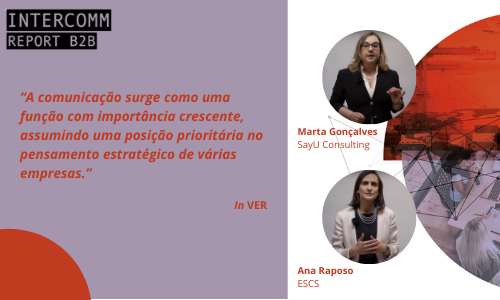
The last year has shown that Portuguese companies are highly resilient, having managed to adapt quickly to ensure their sustainability in the face of a scenario that has brought many new challenges. But in this context, have they been able to find the best ways of communicating?
BY ANA RAPOSO and MARTA GONÇALVES
The pressure placed on the need to sell and to guarantee the operation has forced us to look for different formulas, when the solutions used until now have not proved adequate for a "new normal" - events, traditional networking activities, meetings and fairs that can no longer take place. Traditional points of contact have been lost and obstacles to the relationship that is fundamental to B2B communication have arisen.
This was the moment when many companies began to realize that they needed to take a fresh look at communication and try to figure out what path they could take. They then focused on what they could do, namely: creating a website, boosting social media platforms or creating a newsletter.
This attempt to respond has led to a huge proliferation of content. But content requires planning. In a digital context where audiences are increasingly saturated, "less is more", and it is important to have a coherent message and keep the brand relevant in a veritable "sea" of information and noise.
The basis for achieving this lies in the story. To enter, or be in, a particular market, telling a compelling, exciting and convincing story is as important today as it ever was. A good, well-told story continues to add value, whatever the nature of the brand.
While it is true that B2B companies ultimately depend on selling their products or services, and that in this type of organization in particular, knowledge communication, or technical communication, is a fundamental element that adds value to the entire negotiation process and allows companies to be distinguished, institutional communication, or identity communication, is what allows trust to be conveyed. And it is trust that is the basis of the relationship.
This is where we need to talk about communication. There is sometimes an understanding that communication is merely the transmission of information between a sender and a receiver. Managing communication is, in fact, managing interaction and seeking negotiation and cooperation with a specific objective. Communication allows companies to give meaning and add value to their activity. That's why it's so important to think about communication when we're talking about managing relationships with stakeholders. Communication supports a set of processes that are the basis of the B2B environment: trust, credibility, cooperation, clarity and knowledge.
If relationships are everything in B2B communication, it's the brand and reputation that will help consolidate that relationship. More than ever, companies need to think long-term, boosting their resilience and connection with the market. Here, the value of trust and reputation takes pride of place, as a crucial element in a broad communication strategy that makes the brand recognizable and legitimizes it among those it is aimed at, with clear effects on all dimensions of the business.
Relationships continue and will continue to be the basis of business. There are now more opportunities to work in partnership and holistically, with contacts established with different stakeholders, across multiple sectors, geographies and platforms. Communication is emerging as a function of growing importance, assuming a priority position in the strategic thinking of many companies.
We believe that this context has done for communication what it has also done for digital transformation. We've entered a "golden age" of really understanding the importance of communicating and managing an organization's stakeholders strategically, and understanding that only with highly planned actions will we be able to achieve our goals.
The post-pandemic world will demand more transparency and trust. It will be essential for companies to build and consolidate their relationship with all the agents in the value chain, from the raw material supplier to the end customer, including all other relevant stakeholders, such as employees, partners, regulators and the government. It is crucial to publicize innovation, build synergies and cooperate in a space for dialogue.
Yes, a company can survive without communicating. But it will be more efficient and profitable if it manages its communication processes in a planned and intentional way and ensures a productive connection with the stakeholders who are essential to its activity. We live in a time of rethought relationships, but the need to establish relationships, and to do so through communication, has not been lost. We could even argue that they are more relevant today than ever before.
Read also: InterComm Report - B2B Communication Trends in Global Businesses, a pioneering study developed by the Escola Superior de Comunicação Social, SayU Consulting - Evoke Network and aicep Portugal Global
In SEE
